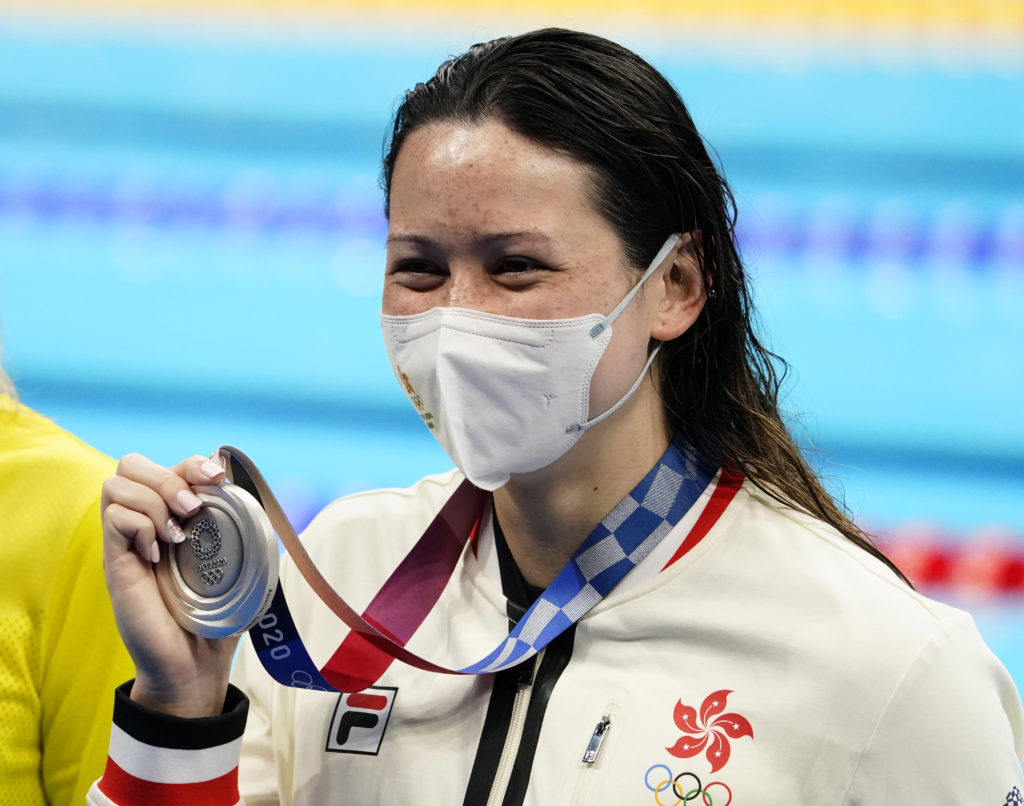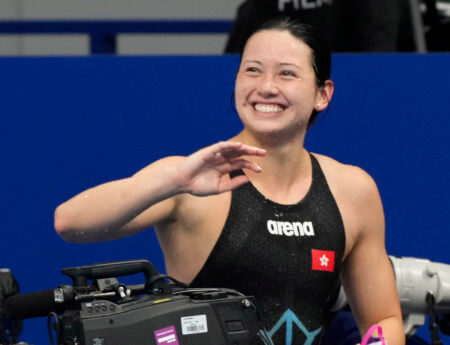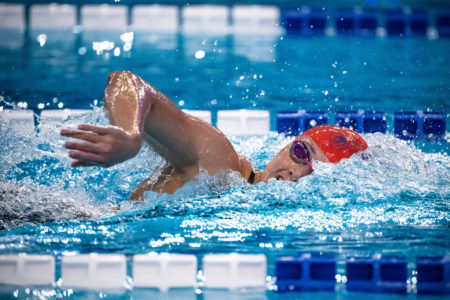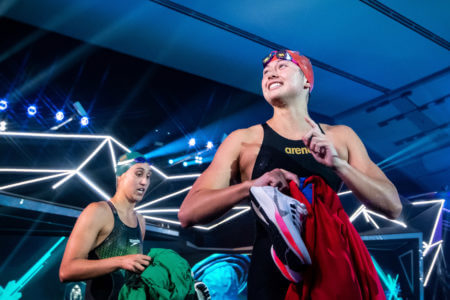Siobhan Haughey Becomes Hong Kong Hero With Magnificent Olympic Performance

Siobhan Haughey Becomes Hong Kong Hero With Magnificent Olympic Performance
(From December’s Swimming World Magazine)
In Hong Kong, people gathered in shopping malls in the middle of the morning, crowding in front of big screens to watch their national hero, Siobhan Haughey, race for Olympic medals. Several of Haughey’s friends were at work at the time, and they watched on office conference room televisions. Others were on the train, where seemingly every passenger had their phone tuned to the women’s 200 freestyle final and, two days later, the women’s 100 freestyle final.
They watched as Haughey became just the fifth individual athlete or team in any sport to win an Olympic medal for Hong Kong. Two days later, she became the first and only Hong Kong Olympian to capture a second Olympic medal. It was part of a truly historic performance at the Tokyo Games for the island nation, which won six total medals after only having won three medals ever prior to 2021.
“In Hong Kong, we’re not really known for our sports, so the fact that people were watching my races and other Hong Kong athletes’ competition, it was great, and I never thought I would receive such great support from the people in Hong Kong,” Haughey said.
The magical run began in the 200 free final, where Haughey was already a strong medal contender. She had finished fourth at the 2019 World Championships, missing a medal by just two tenths, but breaking 1:55 for the first time. “That was one of those races where I wanted to be upset because I missed the podium by two tenths, but I went a best time by more than half a second,” Haughey said. “I wanted to be upset, but I also did my best.”
At that point, Haughey had been training at the University of Michigan under Rick Bishop for four years, and that partnership had been fruitful. Bishop had led Haughey to her first Olympics in 2016, where she finished 12th in the 200 free. A year later, she began making a significant impact on the NCAA level when she finished fourth in the 200 yard free behind a loaded field at the NCAA Championships, and a few months after that, she surpassed all expectations by placing fifth in the 200 meter free at the World Championships. And as she came within one spot of a medal in 2019, Bishop noticed a change.
“I didn’t realize it, but Rick was saying, ‘After 2019 Worlds, Siobhan was training completely differently. She’s always very hard-working, but she’s even more focused. She knew exactly what she had to do,’” Haughey recalled.
“Before Worlds that year, Rick and I sat down, and he was like, ‘You can medal in the 200 free at Worlds,’ and I was like, ‘Yeah, yeah, I can.’ I worked really hard, and that didn’t happen. After that, we went back to training, and we talked about what we wanted to do leading up to Tokyo. This is when we were like, ‘This time, we actually are going to do it. We’re not going to miss by two tenths again.’ You set goals, and you don’t always make them, and you set another goal.”
For this race, her first Olympic final, Haughey and Bishop had devised a plan to maximize her strengths against her accomplished competition.

Photo Courtesy: Rob Schumacher/USA TODAY Sports
“Typically, I would go out fast in the first 100 and hang on in the second 100,” Haughey said. “That’s kind of what I did, but I thought of it differently at the Olympics. We knew that I had really good natural speed, so the first 50, we were just thinking about easy speed and then really build on the second 50. We knew that (Ariarne) Titmus and (Katie) Ledecky were great distance swimmers and they would come back faster than I would, so my strategy was to go out faster and be ahead so they would have to catch me. I think that’s what I did. I think I executed our plan very well.”
In Tokyo, Haughey was the second qualifier out of the semifinals. However, she would be going up against Australia’s Titmus, the gold medalist in the 400 free already in Tokyo and a swimmer who had nearly broken the world record six weeks earlier, and the USA’s Ledecky, the best distance swimmer in history and the defending gold medalist in the 200 free.
But at the halfway point, Haughey held the lead, with Titmus seven tenths behind and Ledecky more than a second back. On the third 50, Haughey built a strong lead, and it would take a stunning final length for Titmus to pass her and secure a gold medal. Still, Haughey finished with a marvelous performance, a 1:53.92 Asian record that made her the fifth-fastest performer in history and earned her an Olympic silver medal, her first medal at any senior-level global championships.
Coming to America
Long before she enrolled at Michigan, Haughey had plans of attending college in the United States, but she was looking mostly at schools on the West coast before she spoke with Claudia Lau, her teammate on the Hong Kong team who was attending Michigan at the time. Lau put her in touch with the Wolverine coaches and then arranged a Skype meeting between Haughey and the team. Haughey had never visited Ann Arbor, but seeing the team vibes through that meeting was enough for her to commit.
Coming to America brought some adjustments, for sure: During Haughey’s freshman year, she found school easy, but everything else very difficult. Training had increased from seven sessions per week to 10, plus weights and dryland, and Hong Kong had not prepared Haughey for the cold Michigan winter. “All of the winter clothes I brought from Hong Kong did not help,” Haughey said. “They weren’t thick enough.”
Haughey remembers times that year when she would call home and not be able to hold back tears, the stresses of the transition getting to her. Two years later, she remembers dealing with a painful ankle injury that flared up suddenly with no obvious cause that no doctor could diagnose. She was barely able to swim or even walk.
During these setbacks, she relied on her teammates to help lift her up. She spoke glowingly about what the other Michigan swimmers provided when she needed it most during her college days. “I always received love and support from my team, but especially during that time. It’s nice to know that when we are going through stuff like that, you have a whole team there to pick you up,” Haughey said. “I never realized that’s going to be a team sport until I got to Michigan. Your teammates are your family when you’re so far away from home. Just the whole team aspect, supporting your teammates with what they’re going through—that’s so important to me. Now, no matter what team I’m on, I try to be that teammate.”
Adjusting to the COVID-19 Challenge
The next challenge would be of a totally different sort, when the COVID-19 pandemic took hold of the world and postponed the Olympics. Haughey was still training in Ann Arbor as a postgrad when pools closed in the United States, and she found out that the national pool in Hong Kong would stay open. So she returned home and continued following the program that Bishop wrote for her.

Siobhan Haughey racing during the 2021 ISL season — Photo Courtesy: Photo Giorgio Scala / Deepbluemedia / Insidefoto
She expected to return to Michigan after a few months, but she ended up staying in Hong Kong all the way through the Tokyo Olympics, departing only to participate in the 2020 ISL season in October and November in Budapest.
In that difficult situation, swimming on the other side of the world from her coach, Haughey found a new group of teammates to rely on. A group of seven swimmers who had been studying in the U.S. or Canada all flew back together, and they formed their own international group. There was a coach on deck in Hong Kong, but the entire group was swimming Bishop’s sets.
Haughey would occasionally Facetime with her coach, and he watched videos of her swimming from time to time, but the two did not see each other in person until they arrived in Tokyo. Haughey was by no means alone among 2019 college graduates in shifting to remote, virtual work during the pandemic, but how many others saw that makeshift setup pay off with Olympic medals?
The Second Olympic Medal
Sometimes, athletes consider their silver medals a consolation prize, the sign of a defeat. For Haughey, even as she surrendered the lead on the final length in the 200 free Olympic final, her silver medal was absolutely a triumph.
“I was so excited after the 200. So many emotions. It’s kind of something you’ve dreamt of for so long, and now you have it,” Haughey said. “I really wanted to celebrate that and have fun, but I had the 100 free heats that afternoon.”
Yes, her reward for the Olympic silver medal was getting to race again nine hours later in the prelims of the 100 free, an event in which she had never qualified for the finals at a World Championships and had only once broken 53 seconds.
Haughey remembers bending down on the starting blocks and thinking, “Wow, I’m really tired.” During the race, Haughey executed what she called a “terrible turn,” and she saw Australian Emma McKeon swimming away from her. Hence, she expected a poor time.
Instead, she swam a 52.70, a lifetime best and Asian record, and that matched the gold medal-winning time from the 2016 Olympics. She was the second overall seed behind McKeon. In the semifinals, Haughey dropped another three tenths, down to 52.40, and she retained the second seed. And in the final, she stuck close to McKeon early on and did not surrender ground down the stretch. She finished in 52.27, earning herself a second silver medal.
“After winning the first medal, I felt the pressure lifted off my shoulders. In the 100, I wouldn’t say I had zero pressure, but I was just trying to enjoy the whole race, and it was another best time, another medal,” Haughey said, before admitting that even she would not have picked herself to finish on the Olympic podium in the two-lap sprint.
Her Olympics concluded when she qualified 15th in prelims of the 50 free, but she withdrew from the semifinals because of a lower back injury that was bothering her. She knew her chances of qualifying for the final, let alone winning a medal in the 50 free, were slim, and she did not want to jeopardize her chances for the upcoming ISL season.
“My coaches were like, ‘I think you’ve done your job. Two medals is good,’” Haughey said.
One Year at a Time

Siobhan Haughey during the 2021 ISL season — Photo Courtesy: Giorgio Scala / Deepbluemedia / Insidefoto
After a short trip back to Hong Kong to celebrate with her family, Haughey jumped back into the ISL season, where she was one of the top performers on a title-contending Energy Standard team. She wracked up SCM wins in the 100 free, 200 free and even 400 free along with relays. She will compete at Short Course World Championships in Abu Dhabi before she heads back to Hong Kong to continue preparing for the 2022 World Championships, scheduled to be held in Fukuoka, Japan. She will likely follow another remote training program from Bishop, who has since departed Michigan to become the head coach at LSU.
Beyond that, Haughey said, “I think this is the first time in my life where I don’t really have a long-term plan. I’m trying to take it one year at a time right now. In the past, I think I had very clear goals: ‘I want to make it to Rio,’ or ‘I want to make it to Tokyo.’ I don’t really know what I want yet. Maybe I’m still trying to figure it out. I’m just taking it one year at a time. I know I still like swimming, and I’m really enjoying what I’m doing right now—maybe more than I did before.
But for the rest of her life, she will be able to look back on the Tokyo Olympics and fondly recall the finest meet of her life, thanks to her special accomplishments in the pool and the special moments produced outside of it. Like when the entire Hong Kong team met her outside the mixed zone following the 200 free medal ceremony and enveloped her in a bear hug. Or when one of the Hong Kong coaches found her immediately post-race and handed her a cell phone.
“I was like, ‘Who’s calling me?’ He’s like, ‘Coach,’” Haughey recalled. “I was like, ‘You’re here. The Hong Kong head coach is upstairs. Rick, my Michigan coach, is also here. Who’s calling me?’ So I said, ‘Hello?’ And it was my mom. She was crying, and she was like, ‘I’m so proud of you. I’m so happy.’ That was such a great moment.”




Proud of you being the 1st HKer to hold world record of 200m free style swimming. Keep up! I’m waiting for the moment when you are the winner of a major event in Olympics.